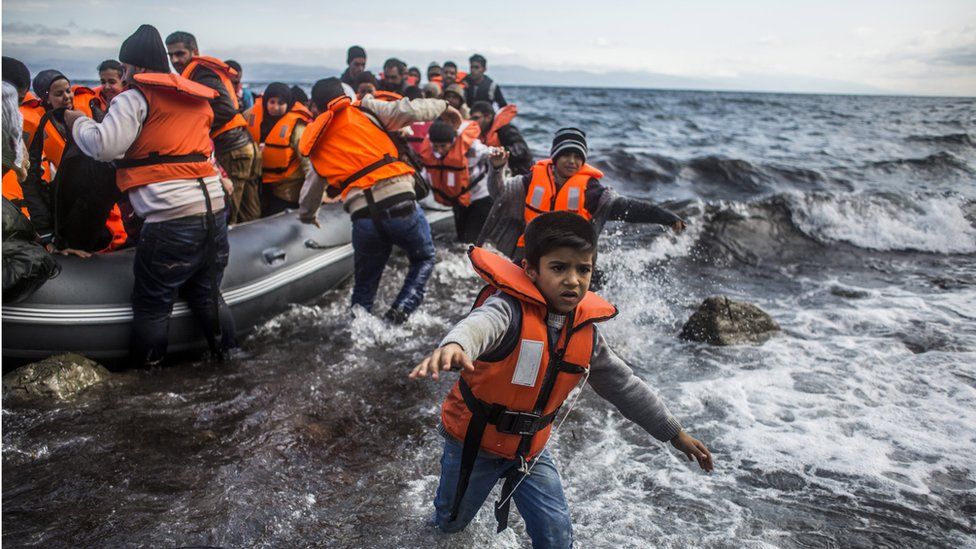Amidst global migration challenges, the city's airport is at the forefront of handling a surge in migrant arrivals. The migrant crisis has placed immense pressure on airport infrastructure, resources, and services. This issue is not just a logistical problem but a humanitarian concern that demands immediate attention and long-term solutions.
The world is witnessing an unprecedented movement of people due to conflicts, climate change, and economic instability. As one of the busiest transit points for migrants, the city's airport is under immense strain. The situation highlights the need for coordinated efforts between governments, international organizations, and local authorities to address the crisis effectively.
This article delves into the complexities of the migrant crisis at the city's airport, exploring its causes, impacts, and potential solutions. By examining the challenges faced by airport authorities and stakeholders, we aim to provide a comprehensive understanding of the issue and propose actionable strategies to mitigate its effects.
- Hd Hub Movies For You Your Ultimate Destination For Highquality Entertainment
- Old Bollyflix Rediscovering The Magic Of Classic Bollywood Movies
Table of Contents
- Introduction to the Migrant Crisis
- Airport Infrastructure Under Pressure
- Economic Impacts of the Migrant Crisis
- Humanitarian Concerns
- Government and International Responses
- Local Community Efforts
- Technological Solutions
- Challenges in Migration Management
- Data and Statistics
- Case Studies
- Conclusion and Call to Action
Introduction to the Migrant Crisis
The migrant crisis strains city's airport as a result of the growing number of people seeking refuge and opportunities in urban areas. This phenomenon has been driven by a combination of factors, including war, persecution, and economic hardship. The influx of migrants places significant demands on airport facilities, which are often unprepared to handle such large-scale movements.
Understanding the root causes of the migrant crisis is crucial in developing effective strategies to address it. While some migrants are fleeing conflict zones, others are seeking better living conditions or escaping environmental disasters. These diverse motivations necessitate tailored approaches to manage the crisis responsibly and compassionately.
Airport Infrastructure Under Pressure
The surge in migrant arrivals has exposed the limitations of airport infrastructure in handling large populations. Terminals designed for commercial passengers are now accommodating temporary shelters, medical facilities, and processing centers for migrants. This adaptation has stretched resources thin, leading to delays, overcrowding, and reduced service quality.
- Necati Arabaci Wife A Comprehensive Look At Her Life Love And Legacy
- Sd Movie Point Hub Your Ultimate Guide To Streaming And Downloading Movies
Local Community Efforts
Local communities have played a vital role in supporting migrants at the airport. Volunteer groups and non-profit organizations provide essential services such as food, clothing, and legal assistance. Their efforts help alleviate some of the burdens on airport authorities while fostering a sense of solidarity and cooperation.
Technological Solutions
Technology offers innovative solutions to manage the migrant crisis more efficiently. Biometric identification systems, data analytics, and mobile applications can streamline processing times and improve resource allocation. By leveraging these tools, airports can enhance their capacity to handle migrant flows while maintaining security standards.
Economic Impacts of the Migrant Crisis
The migrant crisis has significant economic implications for cities and their airports. While the influx of migrants can boost local economies through increased consumer spending and labor force participation, it also imposes costs on public services and infrastructure. Airports must balance the financial burden of accommodating migrants with the potential long-term benefits of integration.
Research from the International Monetary Fund (IMF) suggests that well-managed migration can contribute positively to economic growth. However, this requires strategic planning and investment in infrastructure to support migrant populations effectively.
Humanitarian Concerns
At its core, the migrant crisis is a humanitarian issue that demands empathy and compassion. Migrants often face harrowing journeys and uncertain futures, making it imperative for airports to provide safe and dignified conditions during their transit. Ensuring access to basic necessities, medical care, and legal protection is essential in upholding human rights.
Organizations such as the United Nations High Commissioner for Refugees (UNHCR) advocate for policies that prioritize the welfare of migrants. Their guidelines emphasize the importance of creating welcoming environments that respect the dignity and rights of all individuals.
Government and International Responses
Governments and international organizations are increasingly recognizing the need for coordinated responses to the migrant crisis. Policies aimed at addressing root causes, improving border management, and facilitating integration are being developed and implemented. These efforts require collaboration across borders and sectors to ensure effectiveness.
For instance, the European Union's Migration and Asylum Pact outlines a comprehensive approach to managing migration flows, including support for member states dealing with large numbers of arrivals. Similarly, the Global Compact for Safe, Orderly, and Regular Migration provides a framework for international cooperation on migration issues.
Challenges in Migration Management
Managing migration at the city's airport presents numerous challenges that must be addressed to ensure smooth operations and protect migrant rights. These challenges include:
- Inadequate funding for infrastructure upgrades and resource allocation
- Complex legal frameworks governing migrant processing and status determination
- Cultural and language barriers hindering effective communication
- Security concerns related to screening and monitoring migrant populations
Overcoming these obstacles requires a multifaceted approach that combines policy reform, technological innovation, and community engagement.
Data and Statistics
Data plays a crucial role in understanding the scope and impact of the migrant crisis. According to the United Nations Department of Economic and Social Affairs (UN DESA), there were approximately 281 million international migrants globally in 2020, representing 3.6% of the world's population. This figure is expected to rise as drivers of migration continue to intensify.
At the city's airport, statistics reveal a 20% increase in migrant arrivals over the past year, highlighting the growing pressure on facilities and services. These numbers underscore the urgency of developing scalable solutions to address the crisis.
Case Studies
Examining case studies from other airports facing similar challenges can provide valuable insights into effective strategies for managing migrant flows. For example, the Frankfurt Airport in Germany implemented a comprehensive migrant support program that included dedicated processing centers, language training, and job placement services. This initiative not only improved conditions for migrants but also enhanced the airport's operational efficiency.
Another notable example is the Istanbul Airport in Turkey, which partnered with local NGOs to provide psychosocial support and legal assistance to migrants. Their collaborative approach has been recognized as a model for other airports facing similar situations.
Conclusion and Call to Action
The migrant crisis strains city's airport in ways that require immediate and sustained attention. By addressing the root causes of migration, enhancing infrastructure, and fostering collaboration between stakeholders, we can develop solutions that benefit both migrants and host communities. The challenges are significant, but so are the opportunities to create a more inclusive and resilient global society.
We invite readers to engage in this important conversation by sharing their thoughts and experiences in the comments section below. Additionally, consider supporting organizations working to alleviate the migrant crisis through donations or volunteer work. Together, we can make a difference in the lives of those affected by this global challenge.
- Vegamoviescom2025 Your Ultimate Guide To Stream Movies Online In 2025
- Abu Mudarris Net Worth 2025 A Comprehensive Guide To His Wealth And Achievements


